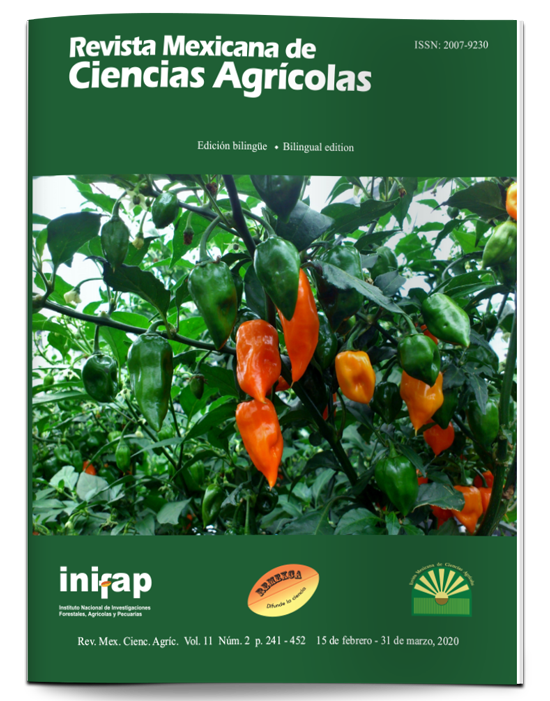Solarized bovine manure in tomato production under shade mesh conditions
DOI:
https://doi.org/10.29312/remexca.v11i2.2299Keywords:
carotenoids, organic fertilizers, yieldAbstract
In organic agriculture, the resources available in the region are used sustainably in order to reduce production costs, especially those related to fertilization. The use of organic fertilizers is an alternative for achieving this purpose. The objective of the present work was to evaluate the effect of solarized bovine manure on the production and quality of tomato fruits. A randomized block design with six repetitions was used; the treatments were four doses of solarized manure (0, 40, 80, 120 t ha-1). There was no significant difference for the variables plant height, number of fruits and yield between the different doses of manure, however, with the application of 120 ton ha-1 the content of β-carotene and anthocyanins was increased by 60.14 and 64.17%, compared to the witness, respectively. Significant differences in soil pH and EC were recorded at the end of the crop cycle. The use of solarized manure is a sustainable option for the production of tomato in shade mesh, since similar results were obtained without the application of inorganic fertilization
Downloads
Published
How to Cite
Issue
Section
License
The authors who publish in Revista Mexicana de Ciencias Agrícolas accept the following conditions:
In accordance with copyright laws, Revista Mexicana de Ciencias Agrícolas recognizes and respects the authors’ moral right and ownership of property rights which will be transferred to the journal for dissemination in open access. Invariably, all the authors have to sign a letter of transfer of property rights and of originality of the article to Instituto Nacional de Investigaciones Forestales, Agrícolas y Pecuarias (INIFAP) [National Institute of Forestry, Agricultural and Livestock Research]. The author(s) must pay a fee for the reception of articles before proceeding to editorial review.
All the texts published by Revista Mexicana de Ciencias Agrícolas —with no exception— are distributed under a Creative Commons License Attribution-NonCommercial 4.0 International (CC BY-NC 4.0), which allows third parties to use the publication as long as the work’s authorship and its first publication in this journal are mentioned.
The author(s) can enter into independent and additional contractual agreements for the nonexclusive distribution of the version of the article published in Revista Mexicana de Ciencias Agrícolas (for example include it into an institutional repository or publish it in a book) as long as it is clearly and explicitly indicated that the work was published for the first time in Revista Mexicana de Ciencias Agrícolas.
For all the above, the authors shall send the Letter-transfer of Property Rights for the first publication duly filled in and signed by the author(s). This form must be sent as a PDF file to: revista_atm@yahoo.com.mx; cienciasagricola@inifap.gob.mx; remexca2017@gmail.
This work is licensed under a Creative Commons Attribution-Noncommercial 4.0 International license.



